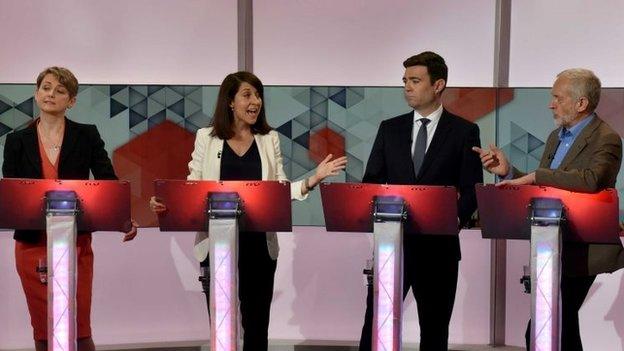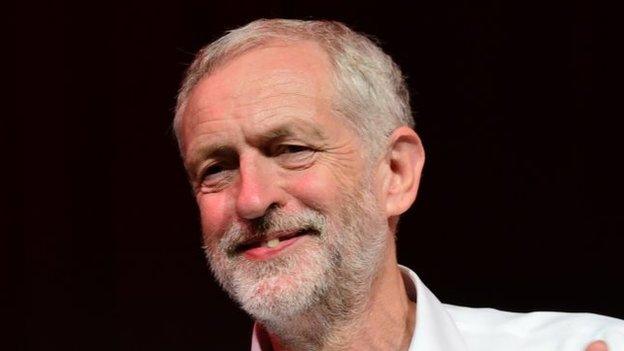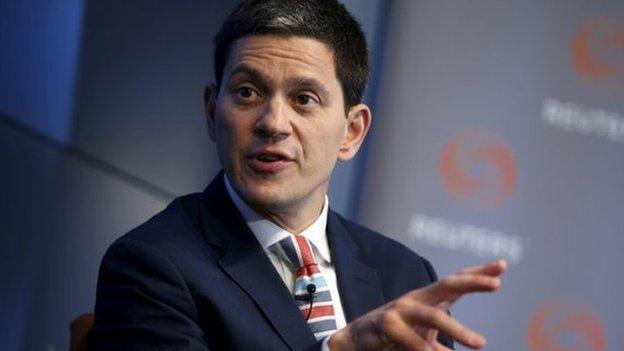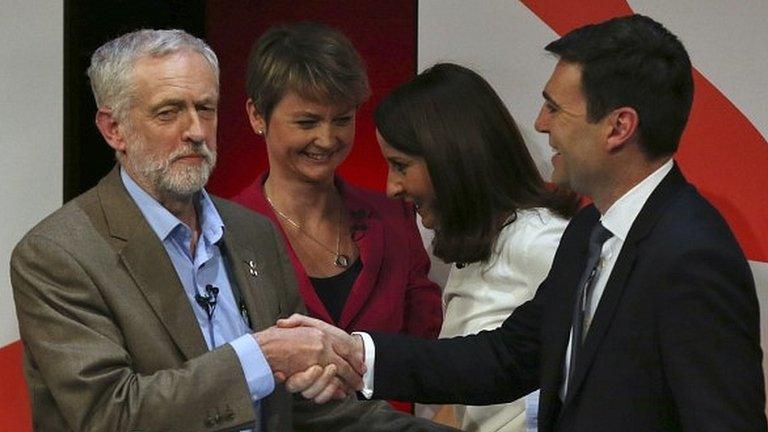Why most of the 'Stop Corbyn' schemes won't work
- Published

Ballot papers are going out this morning for the Labour leadership contest after a weekend of various grandees apparently dreaming up new schemes to stop Jeremy Corbyn.
Almost none of these will work. Why?
Because, on current polling, it all comes down to whether you think the people voting for Andy Burnham or those voting for Yvette Cooper are more likely to put Corbyn as their next preference.
And there is no decent publicly available evidence that either of them are. Furthermore, for similar reasons, there is no arithmetic reason why non Corbyn candidates withdrawing would do anything to stop Corbyn.
Voters in this election will be given the opportunity to rank the candidates in order of preference. The first preferences are counted up, and the person with the fewest is eliminated from the contest - and the votes they received are given to whoever each person that voted for them rated as their second preference.
If after that none of the candidates has achieved 50% of the vote, the candidate with the lowest number of votes is eliminated and their votes are given to whoever they put as their higher preference amongst the two remaining candidates. By definition, this gives one of the two remaining candidates a majority of the votes.
Few polls
Current polling puts Corbyn first, Cooper and Burnham roughly tied in second, and Kendall trailing in third. So either Cooper or Burnham will most likely be the candidate that faces Corbyn in the final round. If you want to stop Corbyn, you'll be voting for some combination of Cooper, Burnham and Kendall as your first three preferences. So your vote WILL end up being for whoever faces Corbyn in the final round, WHICHEVER order you put those three in.

Jeremy Corbyn is making the running in the Labour leadership contest
The only way you can affect the number of votes Corbyn gets is by trying to second-guess the second preferences of people that vote for eliminated candidates. If you believe the polls, Kendall's almost certain to be eliminated first, so you can't affect that. But one of Burnham and Cooper won't be eliminated before the final run off with Corbyn. Whichever one is eliminated will have their preferences redistributed to either Corbyn or his opponent.
So, in theory, if you, the "stop Corbyn" voter thought that, say, Burnham's supporters are more likely to have Corbyn as their next preference than Cooper's, you should put Burnham ahead of Cooper in your preference list even if you ACTUALLY prefer Cooper to Burnham - because it'll starve Corbyn of the extra votes he'd get if Burnham was knocked out.
The thing is, I am not aware of any decent evidence that this is the case. We have very few polls on the Labour leadership election - and those that exist (necessarily) have small samples of what Burnham and Cooper's second preferences would be. Very roughly speaking, the polling tables I've seen suggest supporters of both split their second preferences about 30/70 between Corbyn and his opponent. So it's not clear which of these you should give a higher preference to tactically stop Corbyn anyway.
In other words, there is no obvious way to tactically vote against Corbyn. If you want to stop him he'll be your last preference anyway - and it literally doesn't matter what order your first three preferences are in. Crazy thought though it might be, you can happily vote for candidates on the basis of, y'know, how good you think they are.
A quick addendum on candidates dropping out
This actually has implications for people dropping out of the race as well. Ballot papers have already gone out, but Cooper could, for example, tell all her supporters to first preference Andy Burnham instead. In terms of tactical voting, there is NO POINT in any of the three non Corbyn candidates doing this. All their votes will be aggregated to support whoever faces Corbyn in the final round anyway as a result of the preference system.
Of course, that's just on the arithmetic. There might be a case for candidates dropping out if they think that a unified anti-Corbyn campaign would be more effective at winning over existing Corbyn supporters - perhaps because they spend less time attacking each other. But this is necessarily pretty speculative, especially this late in the game.
This piece was first published on the Newsnight Live blog
- Published17 August 2015

- Published12 September 2015
